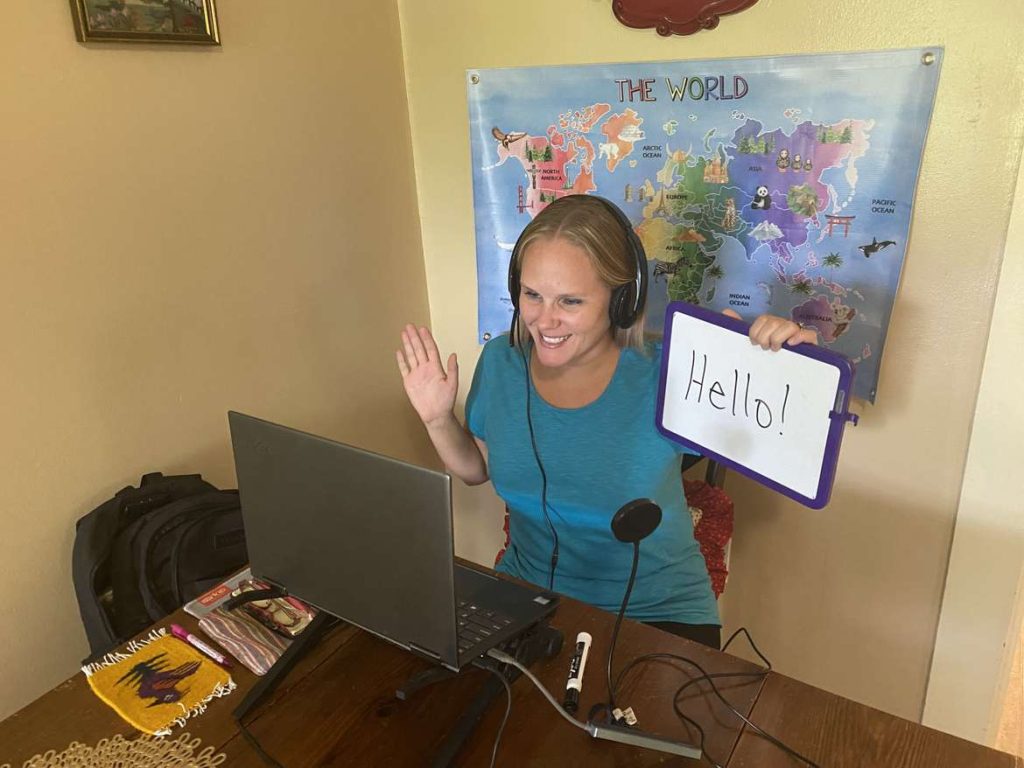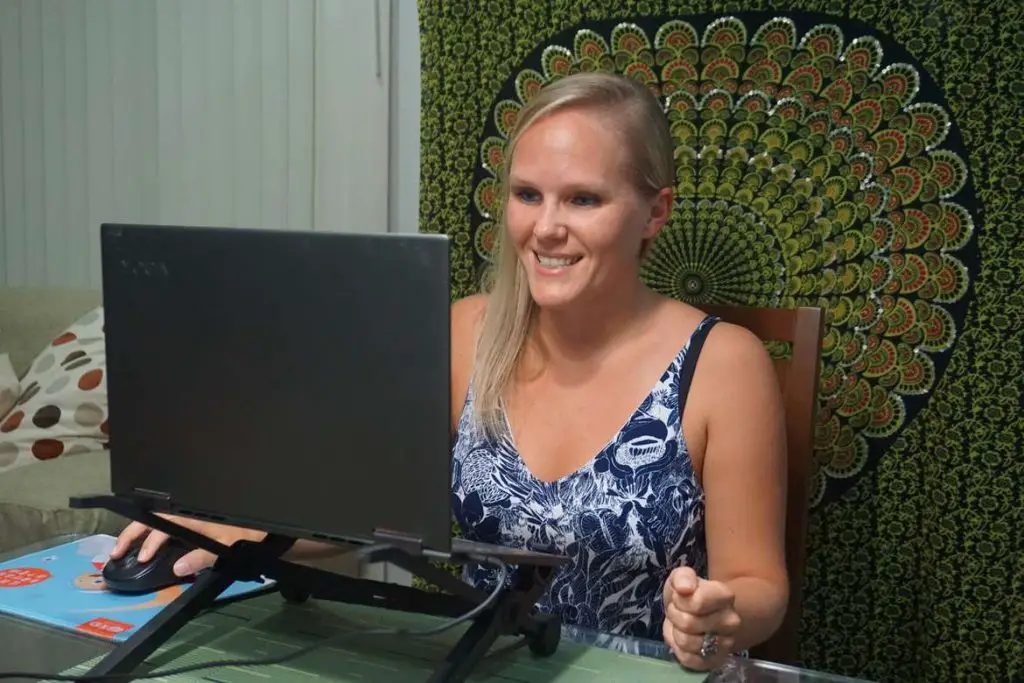Welcome back to ESL Around the World – the interview series made for people who want to move abroad to teach English. Today we’re chatting with someone who’s going to tell us everything you need to know about teaching English in South Korea. Every interview in this series is meant to give you all the info you would need to know about teaching in a certain place. Let’s dive in!
Meet Gwendolyn

Gwendolyn is an online English teacher with the Chinese education company VIPKID. She became a digital nomad in 2014, at the age of 39, after deciding that there must be more to life than spending 70 hours a week as a marketing manager in investment banking. She has proven that you’re never too old to start a location-independent lifestyle!
Originally from Glasgow, Missouri, Gwendolyn has lived in several places around the world including London, England; Daegu, South Korea; and now Medellin, Colombia. She has traveled extensively – to over 55 countries! Find out more about Gwendolyn on her blog Memories Not Material Things and follow her adventures on Facebook and Instagram.
Now that you’ve gotten to know Gwendolyn a bit, let’s get on with the interview!
Teaching English in South Korea
Where did you teach and what was your position?
My first ESL teaching experience was in Daegu, South Korea. I worked at two different ‘hagwons’, which are after-school, private English programs.
In the morning from 10.00 am to 2.00 pm I taught at a pre-school with 3 to 6-year-olds. In the afternoon from 4.00 pm to 8.00 pm I taught at a small private hagwon where the students aged between 7 and 18 years old.

What were the hours and pay like?
I worked for a private company, so the hours ended up being too long for me. I was contracted to work 30 hours a week but often had to teach more hours than that. Although I got paid overtime for those hours, I couldn’t really decline the work. Most weeks I taught 37 hours. With lesson planning and commuting between the two schools, I was technically working around 47 hours a week.
The pay worked out to be around US$20 per hour, which isn’t a lot. My contract was for 2.1 million won per month, which is about US$2,000 per month. I made a little bit more with my overtime hours.
However, the great thing about working in South Korea is the benefits package. Most hiring companies in South Korea will pay for your return airfare and your housing. I was lucky in that my company paid for not only my housing but my utilities and my internet connection. In South Korea, they are also required to contribute to a pension plan for you. When I left Korea I got a US$3,500 pension refund!
Also, most hiring companies in South Korea will give you a one month’s bonus if you complete the year contract. So these extras really boost your overall pay. Plus the cost of living is cheap in Korea. If you are disciplined, you can easily SAVE $10,000 to $20,000 in a year teaching there.
What is a typical day like?
I worked for a very atypical type of company in South Korea, which made my schedule very different from day-to-day. The company I worked for basically subcontracted me out to other small schools and I also did one-on-one conversation classes with adults.
If you are hired directly with one hagwon, your typical day will be from around 3 pm to 10 pm. Generally, you arrive at the school around 3 pm to do the lesson preparation and you then teach from 4 pm to 10 pm. Some days you do fewer hours because most schools don’t require teaching more than 30 hours a week. Some schools have a Korean teacher in the room to help out, but I did not have a co-teacher. I was given a textbook to teach from and I had full autonomy over how I taught the lesson.

What are the pros and cons of your job?
The pros of teaching in South Korea are that it is a very safe country to live in. Crime rates are incredibly low. I’ve heard of other teachers who left their wallets in the back of a cab and someone went through the effort to find their address and post it back to them! Plus you aren’t working full time so you have lots of opportunities to explore not only Korea but some of the surrounding countries like Japan, Taiwan, and China.
The cons are that South Korea, like most Asian countries, work hard. They are pretty unforgiving about letting you have a day off. If you get sick, you are still expected to work. If a family member dies, it can be difficult to get a leave of absence. This same level of work ethic is instilled in the children and it can be hard emotionally to be teaching children at 9.30pm when you can see they are exhausted.
Overall though, I’d recommend teaching in South Korea.
What do you need to teach in South Korea?
Most companies in South Korea are looking for native English speakers with a Bachelor’s Degree. A TEFL will help but isn’t necessary. South Korea is a little superficial too. So sadly looks will play an important role in getting you hired. A young, thin, pretty, blonde, American girl is the most sought-after applicant.
But don’t let that discourage you! I met teachers of all sizes and ethnicities! The one thing that they aren’t forgiving of is tattoos and piercings. If you have those, keep them covered.
You will get need to get a work visa to teach in Korea, but your hiring company can help you with that. There is a lot of paperwork to submit to get a visa so have this ready. You will need a certified and apostilled copy of your degree along with the transcripts, a resume, a copy of your passport, an FBI or criminal record background check, a completed health statement form, and four passport size photos.

What’s the best way to find a teaching job in South Korea?
I used a recruitment company to get my job. If this is your first time teaching abroad or in South Korea, then I’d highly recommend going this route. They help you find a job and tell you what you need to do when. Plus, to some extent they have vetted the companies, so you know that you are more likely to get a job teaching for a good school.
Be warned, some hagwon schools in South Korea are notorious for not paying teachers and closing suddenly, so you want to make sure you get hired by a good company.
I used a small recruitment company called Teach ESL Korea. If you are happy to go it alone, I’d check some of the many postings on Dave’s ESL Cafe Job Board.
Please note that there are two types of schools to teach at in Korea. There are the public schools (EPIC) and the private after schools (hagwons). The hours and teaching experience are quite different for each. My experience is based on teaching with a hagwon. Getting a job with EPIC is harder and is very different.
Why did you choose to live and teach in South Korea? What did you like and dislike about it?
I chose to teach in South Korea because the potential to save money was huge and I needed to pay off some credit card debt. Also, I liked that the country was safe for a white female. Moreover, I had had a pen pal from South Korea when I was younger and I had learned a lot about the culture, so was interested in seeing this country.

What is the cost of living like compared to your earnings? Are you able to save money?
The cost of living in Korea is very cheap. As stated above, you can easily save a lot of money whilst still doing a lot of traveling. Because your housing and airfare are included, you only pay for your food, transportation, cell phone, and personal things whilst there. If you eat at local Korean restaurants you can have a delicious filling meal for only $US3. Local bus fares are less than US$1. Intercity buses are luxurious and cheap too! Western food and toiletries are expensive though, as they are anywhere.
Have you taught in another city or country before?
South Korea was my first ESL teaching experience, so it was quite a learning curve for me! I am now teaching online with VIPKID. Personally, I prefer the one-on-one lessons and the flexibility of online teaching. However, I do miss the relationships and face-to-face contact that I had with my hagwon students. After a year of teaching the same kids, you become quite attached.

What advice do you have for people considering moving abroad to teach English?
I would advise anyone moving abroad to teach English to go with an open mind and at least US$2,000 in savings. Setting up a new life in a foreign country incurs more costs than you might think about, and you will have to wait a month to get your first paycheck. There are a lot of upfront costs (like the airfare and visas) too! I didn’t bring enough and had to eat ramen noodles for a month!
Also, be gentle with yourself. There will be challenges and failures. Roll with the punches. But never forget that there is always a huge support network of other experienced foreign teachers there that can help you navigate your way. Don’t be afraid to ask them for help. More than likely, someone showed them the ropes too.
Search the FaceBook groups for things like ‘Expat Women in X’ and ‘ESL Teachers in X’. Find one for the city you are in and post your questions there. Also, be brave and put a post in one of those sights that say, ‘Hey I am new in X! Would anyone be up for a coffee or a drink soon?’ It may be hard to put yourself out there like that, but I can assure you that you will get dozens of responses back from people that would love to meet up!
Finally, read as much about the country and the culture and ESL teaching before you arrive. Amazon had some great self-published books from ESL teachers about what it was like to teach in South Korea. Reading these and knowing what to partly expect before I arrived really helped.
Good luck!
Conclusion
There you have it! As Gwendolyn mentioned, you can save quite a bit of money teaching English in South Korea. I think this is one of the countries people should consider if their goal is to really make some money! Sasha’s brother has been teaching in a Hagwon in Seoul for the past year and he’s saved enough to have a grand summer in Europe. Lucky!
Living in South Korea is also great for traveling. You have quick and easy access to China, Japan, Taiwan, and even Southeast Asia isn’t that far away. There are many things to see and do in South Korea as well. They love spas there. They’re called “Jimjilbang” and they’re an experience to be had. There’s one in Seoul that’s open 24 hours. They have sleeping rooms and everything. Whenever Sasha and I would go there for visa runs from China we would always stay one night there. You get a spa experience and one night of accommodation. Win-win!
Gwendolyn also mentioned that getting a TEFL certificate will help you get hired. Not only will it help you find a job, but it will also teach you classroom management, how to plan a lesson, be entertaining while teaching, and help you teach with confidence.
We got our TEFL certificates with BridgeTEFL and would highly recommend them. They provide a stellar course and will pair you with an online mentor to grade your assignments and help you as you progress. To learn more about Bridge and the world of TEFL certifications, click the button below. It will take you to an article we wrote about getting certified.
Tell Me More About TEFL Certificates
Is South Korea not the country for you? Check out our other interviews: Teaching English in:
Like this post? Pin it for later!
[one_third padding=”0 3px 0 0px”]

[one_third padding=”0 3px 0 3px”]

[one_third_last padding=”0 0px 0 3px”]

Stay tuned for the next interview in our ESL Around the World Series!
This post may contain affiliate links. If you purchase something through our link we will earn a commission at no extra cost to you! The earnings go towards running this site. Thank you for the support! We only recommend products we have personally used and trust.




I taught in South Korea for 3 years. You should read this book if you are interested in teaching and living in South Korea.
SOUTH KOREA: The Price of Efficiency and Success https://www.amazon.com/dp/1674232152/ref=cm_sw_r_cp_api_i_6-mbEbT3HSTWP
Thanks for the tip! Did you enjoy your 3 years in South Korea?